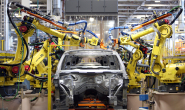Analysis

February 13, 2022
Ford, Toyota, Honda See Continued Disruptions from Bridge Protests
Written by David Schollaert
Ford, Toyota and Honda continued to see production disruptions at various factories due to ongoing protests by anti-vaxxers blocking the Ambassador Bridge, the busiest international border crossing in North America.
![]() The auto industry has struggled to get parts over the U.S.-Canada border as the protest by truck drivers at the bridge had entered its fifth day on Friday, leading all carmakers to reroute shipments, where possible. Though most truckers had left by midmorning, they were replaced by several hundred protesters on foot.
The auto industry has struggled to get parts over the U.S.-Canada border as the protest by truck drivers at the bridge had entered its fifth day on Friday, leading all carmakers to reroute shipments, where possible. Though most truckers had left by midmorning, they were replaced by several hundred protesters on foot.
The latest obstacle in the North American auto industry saga could not have come at a worst time, exacerbating production delays from supply-chain shortages relating to the semiconductor chip scarcity that have persisted for well over a year.
“This interruption on the Detroit/Windsor bridge hurts customers, auto workers, suppliers, communities and companies on both sides of the border that are already two years into parts shortages resulting from the global semiconductor issue, COVID and more,” a Ford spokeswoman told Steel Market Update (SMU). “We hope this situation is resolved quickly because it could have widespread impact on all automakers in the U.S. and Canada.”
Ford’s Dearborn, Mich.-based automaker confirmed that its plants in Oakville and Windsor, Ontario, are running at reduced capacity, while its Ohio Assembly Plant, in Avon Lake – which builds Super Duty chassis cabs, medium-duty trucks and E-series vans – is down because of a part shortage associated with the protests.
Toyota Motor Corp. is now seeing periodic downtime at its engine plants in Buffalo, W.Va., and Huntsville, Ala., due to the Ambassador Bridge blockade, in addition to the other production interruptions at its Canadian assembly plants in Woodstock and Cambridge, Ontario, and in Georgetown, Ky.
“Due to a number of supply-chain, severe-weather and COVID-related challenges, Toyota continues to face shortages affecting production at our North American plants,” a company spokeswoman said. “Our teams are closely monitoring the situation and working diligently to minimize the impact on production.”
“We expect disruptions through the weekend, and we’ll continue to make adjustments as needed,” she added. “While the situation is fluid and changes frequently, we do not anticipate any impact to employment at this time.”
The suspension bridge is a major international gateway between the U.S. and Canada. About $356 million in goods travel between Detroit and Windsor every day across the Ambassador Bridge.
The auto industry is particularly vulnerable to the delays caused by the protesters. In 2021, 7.3% of U.S. vehicle sales resulted from Canadian-built vehicles, according to Edmunds.
Honda Motor Co. also experienced additional production delays because of the blockade in Windsor. The Japanese automaker’s Alliston, Ontario, assembly suspended manufacturing on one production line during the day shift for three straight days as of Friday, Feb. 11, the company told SMU.
All Honda automotive manufacturing operations in the U.S., though, were scheduled to run production, he said. “As this remains a fluid situation, we are monitoring the disruption of transportation between Canada and the U.S. and will adjust production as necessary.”
Stellantis N.V. – Chrysler’s European parent company – had several U.S. and Canadian plants cut short multiple shifts throughout the week due to parts shortages caused by the closure of the Detroit/Windsor bridge. The good news for the automaker was that all its North America plants started back up Friday morning, the company said.
For GM, which was forced to cancel two production shifts at its Lansing Delta Township plant in Michigan earlier last week, said that all plants were running regular production as of Friday morning.
The same was said of Daimler’s Mercedes-Benz’s production plants in Tuscaloosa, Ala., and Charleston, S.C., which have not been impacted by the protests and are running normally. Nissan confirmed that its U.S. assemblies in Smyrna, Tenn., and Canton, Miss., have not been affected either and continue to run regular production shifts.
And it’s not just automakers that are being impacted, so too are some steelmakers. Canadian flat-rolled steel producer Algoma Steel Inc. flagged the issue on an earnings conference call on Friday.
“Our production is reasonably high. … It’s really the demand side that’s evolving day-to-day with things like the blockades at the bridges,” company CEO Michael McQuade said.
Sault Ste. Marie, Ontario-based Algoma makes hot-rolled coil, cold-rolled coil and plate. It is an important supplier not only to the Canadian market but also to the U.S. Midwest and Great Lakes region.
By David Schollaert, David@SteelMarketUpdate.com






